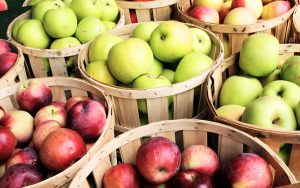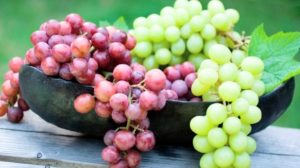“Eat more fruits and vegetables” – a phrase you will undoubtedly hear with any diet or fitness plan you choose. Here at UTHFA, we agree with this advice. However, we also want to point out that fruits and vegetables are subject to pesticide exposure.
Health Risks
Pesticides are chemicals that destroy pests. They are commonly used to protect plants, including the fruits and vegetables that we eat. Although the use of pesticides allows farmers to grow these foods more efficiently, these chemicals have been shown to cause health problems in humans, including disruption of the endocrine system and reproductive health (1), respiratory symptoms (2), cancer (3), and neuro-degeneration leading to Alzheimer’s disease and Parkinson’s Disease (4).
Cost
 With all the evidence pointing towards toxicity in pesticide use, you may want to switch to organic foods. Organic farming restricts the use of pesticides and fertilizers. Understandably, organic foods usually cost more than their non-organic counterparts. In fact, in a study of more than 100 product pairings, organic foods were 47 percent more expensive, on average.
With all the evidence pointing towards toxicity in pesticide use, you may want to switch to organic foods. Organic farming restricts the use of pesticides and fertilizers. Understandably, organic foods usually cost more than their non-organic counterparts. In fact, in a study of more than 100 product pairings, organic foods were 47 percent more expensive, on average.
Our Advice
We understand that the cost of organic foods is quite discouraging for consumers. If you can afford to buy only organic foods, then, by all means, do so. However, if you prefer not to switch to organic products completely, then purchase the organic variety for the produce items that are most contaminated with pesticides.
According to the Environmental Working Group, here is a list of the items that are most contaminated with pesticide use, in order of contamination (higher rank = more pesticides), also known as the “Dirty Dozen”:

 Strawberries
Strawberries- Apples
- Nectarines
- Peaches
- Celery

 Grapes
Grapes- Cherries
- Spinach
- Tomatoes
- Sweet Bell Peppers
- Cherry Tomatoes
- Cucumbers
Here is a list of the least contaminated foods, in order of least contamination (higher ranking = less pesticides), also known as the “Clean Fifteen”:

 Avocados
Avocados- Corn
- Pineapples
- Cabbage
- Sweet Peas – Frozen
- Onions

 Asparagus
Asparagus- Mangos
- Papayas
- Kiwi
- Eggplant
- Honeydew Melon
- Grapefruit
- Cantaloupe
- Cauliflower
What does this mean?
You should not avoid the foods in the dirty dozen. Even the fresh foods in that list are healthier than processed foods. If you don’t want to switch to the organic variety of these items, there are still significant health benefits from the non-organic variety. However, if you are willing to make a slow transition to purchasing at least some foods in the organic variety, then these two lists may help you make better decisions.
Happy eating!